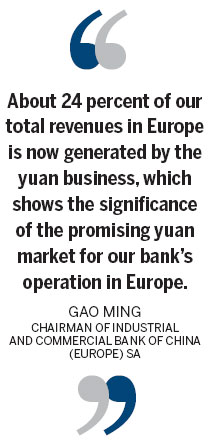Paris enters the fray
Updated: 2013-07-19 09:13
By Li Xiang in Paris (China Daily)
|
|||||||||||

Paris' bid to become a major offshore yuan-trading hub in the eurozone is expected to get new impetus from the anticipated currency swap deal between the European Central Bank and the People's Bank of China.
"The ECB and the PBOC have started discussions and they are not far from conclusion," Philippe Mongars, deputy director of the market operation department at the Bank of France, told China Daily at a recent financial forum in Paris.
Xi Yu, a specialist at the monetary policy department of the PBOC, says that the Chinese central bank is willing to promote a currency swap with the ECB as it would be a major step in ensuring market confidence in yuan liquidity in the eurozone.
Governor of the Bank of France Christian Noyer said earlier that Paris is keen to have a currency swap deal with Beijing because the availability of a liquidity safety net in renminbi in the eurozone would foster growth of the yuan business and provide reassurance to market participants that liquidity would remain available in extreme situations.
"In the euro area, Paris has already constituted a strong base to further develop renminbi business through trade settlements and to expand the offer of financial services by banks active in Hong Kong and the Chinese mainland," he said.
An important pool of French corporations, which are among the most active investors in China, have shown increasing interest in issuing yuan-denominated bonds to accompany their investment strategy in China, Noyer said.
The French capital has laid out three major objectives to transform itself into an offshore yuan-trading market, according to Arnaud de Bresson, chief executive of Paris Europlace, a finance industry group.
The first is to develop the best yuan-denominated offer and services for companies including small and medium-sized enterprises and to accompany the development of their trade and investment activities in China, de Bresson says.
Meanwhile, the city is aiming to organize an efficient offshore renminbi liquidity pool to retain and recycle renminbi flows including the Sino-African business flows that are traded through Paris.
The third objective is to offer the best liquidity and foreign exchange rates to international banks active on the renminbi market at any time in the day complementary with Hong Kong's trading hours.
To achieve that, Paris has started to promote products and services in renminbi such as account services, deposits, bank loans, offshore yuan-denominated bond issuance, trade finance and cross-border yuan fund transfer, according to de Bresson.
He cites the eurozone's extensive trade relations with China, the strong presence of French financial institutions in Asia as well as a solid base of French corporations that are among the most active investors in China as the key advantages of Paris becoming an offshore yuan market.
French companies are among the major European users of yuan-denominated bonds in Hong Kong, also known as the dim sum bonds.
Offshore yuan-denominated bonds issued by French companies amounted to nearly 7 billion yuan ($1.14 billion; 870 million euros) in 2011 and 2012, higher than the 3.5 billion yuan for UK corporations, according to Europlace.
With the yuan business flourishing outside Hong Kong and the mainland, a growing number of French companies are also looking at opportunities to float yuan-denominated bonds in Europe.
The first Paris-listed yuan bond issuance was made by Alstom, France's transport infrastructure and power generation company, which raised 500 million yuan at an interest rate of 4.25 percent in March 2012, according to figures from French law firm White & Case LLP.
French energy company Air Liquide, auto parts supplier Veolia, cement producer Lafarge as well as French bank Societe Generale, were also among the active yuan bond issuers in Europe.
"The main objective of issuing yuan-denominated bonds is to serve the companies' strategy to invest in China," says Gilles Endreo, a partner at White & Case LLP. "Multinational companies used to be the main players in the yuan market, but now an increasing number of small and medium-sized companies are hoping to gain access to the offshore yuan bond market."
Chinese financial institutions in France have also been benefiting from the growing interest in yuan business in the French capital.
"About 24 percent of our total revenues in Europe is now generated by the yuan business, which shows the significance of the promising yuan market for our bank's operation in Europe," says Gao Ming, chairman of Industrial and Commercial Bank of China (Europe) SA.
lixiang@chinadaily.com.cn
( China Daily European Weekly 07/19/2013 page7)
Today's Top News
List of approved GM food clarified
ID checks for express deliveries in Guangdong
Govt to expand elderly care
University asks freshmen to sign suicide disclaimer
Tibet gears up for new climbing season
Media asked to promote Sino-Indian ties
Shots fired at Washington Navy Yard
Minimum growth rate set at 7%
Hot Topics
Lunar probe , China growth forecasts, Emission rules get tougher, China seen through 'colored lens', International board,
Editor's Picks

|

|

|

|

|

|





